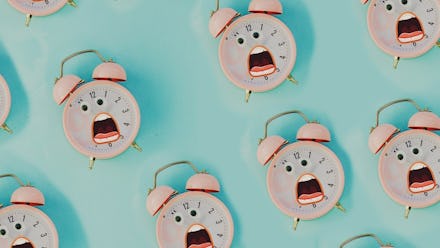How to wake up way with way more energy, according to sleep specialists

Do you aspire to awaken every morning as bright-eyed and refreshed, with Disney birds singing on your shoulder — but instead struggle to peel yourself out of bed, briefly entertaining the idea of not showing up to work? You don’t actually need to play hooky to get the rest you need. Here are seven ways to ensure you wake up feeling energetic and ready to carpe the damn diem — rather than struggle through it, feeling lethargic — according to sleep medicine specialists.
Figure out how much sleep you need, and schedule it accordingly
Adults need a recommended seven to nine hours of sleep per night, Nathaniel Watson, co-director of the UW Medicine Sleep Center, tells Mic. To figure out where you fall within that range, next time you go on vacation (or have a long weekend), go to bed at the same time every night, and wake up spontaneously, without the help of an alarm. Later, calculate how many hours you tended to sleep per night.
Schedule your sleep and wake times accordingly. If you get even 15 minutes less sleep than you normally do per night, you can accrue sleep debt that can make you feel groggy upon awakening and throughout the rest of the day, Watson says.
Maintain a consistent sleep schedule, even on weekends
Aim to sleep and wake up at the same times every single day — going to bed at 9:00 p.m. every weeknight and 2:00 a.m. every weekend won’t cut it, says Charles Czeisler, chief of the division of sleep and circadian disorders at Brigham and Women's Hospital.
Doing so will make your body basically feel like it’s flown across five time zones on Saturday morning, and again on Monday morning, resulting in social jet lag, a condition in which your sleep time falls out of sync with social obligations like work or school. On Monday, when you’re supposed to be awake and productive, you feel sleepy and sluggish. “Social jet lag is probably one of the biggest causes of grogginess,” Czeisler says.
Don’t hit snooze
If you hit snooze on your 7:00 a.m. alarm every 10 minutes, over and over, to clock in more shuteye after staying up past 2:00 a.m., “you have totally trashed your sleep,” Czeisler says. In experiments that involve interrupting participants’ sleep every 10 minutes, “they’re totally grogged out by the time they get up because the brain needs uninterrupted sleep.”
Those 10-minute naps won’t add up to the quality sleep you need to feel rested, since your alarm will go off before you ever get a chance to enter deeper, more restorative stages of sleep, Czeisler explains. If you stayed up late, it’s better wake up when your alarm goes off and sleep at your regular bedtime that night to get back on track.
Avoid sleep aids
Medications like Benadryl, Advil PM, and ZzzQuil all contain an ingredient called diphenhydramine, which helps you fall asleep — but it can also interfere with your ability to awaken feeling perked-up and ready to go the next morning, Czeisler says.
Skip the nightcap (or make it a small one)
While booze might help you fall asleep faster, it can lower your sleep quality in a number of ways, leaving you bleary-eyed the following day, Czeisler says.
For instance, it can prevent you from entering deep, restorative rapid eye movement (REM) sleep previously mentioned, as well as make you wake up in the middle of the night, possibly by disrupting your body’s natural production of chemicals that make you feel sleepy or awake after certain amounts of time, per the National Sleep Foundation. It can also make you get up to pee more frequently.
Try gentle-wake sunrise alarms
Casper, Philips, Lumie, and a number of other brands have recently released alarm clocks that mimic sunrise and gradually brighten, gently rousing you from slumber — rather than startling you awake, like a conventional alarm clock.
Not only might a gentle alarm make getting out of bed a more peaceful experience, it could help stabilize your sleep schedule after a few weeks, leaving you feeling rested each morning, Czeisler tells Mic. But you need to use it routinely, and maintain consistent sleep and wake times. “Light is the single most powerful synchronizer of our internal biological clock,” he says. Again, though, “it’s not a substitute for a consistent schedule.”
Seek help if you think if you have a sleep disorder
If you maintain a regular sleep schedule, and log the recommended seven to nine hours of sleep a night, yet still wake up exhausted, you may have a sleep disorder. For instance, waking up gasping or short of breath could indicate sleep apnea, Watson says. So might a partner who tells you that you not only snore, but also stop breathing at night. Meanwhile, struggling to fall or stay asleep, or awakening too early in the morning, could be signs of insomnia.
Talk to your primary care doctor if you suspect you have a sleep disorder. They might be able to refer you to a sleep specialist, who can dig deeper into what’s going on and work with you to address it. Waking up needn’t be a struggle, and in fact, there are steps you can take to make it not just bearable, but rejuvenating.